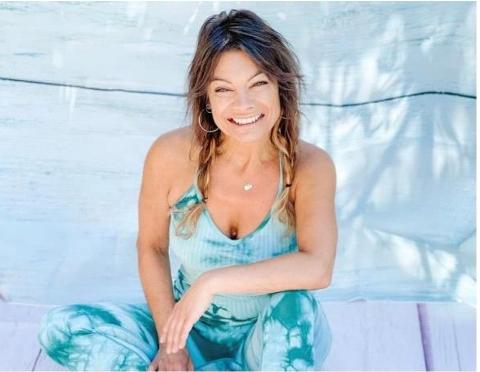
Sara Eker is a 49 year old woman who grew up in North London, UK. She went to North London Collegiate School in North London, then did her B.Sc (Hons) Degree in Psychology at City University in Islington, London. She runs an online Fitness, Nutrition, and Mind Coaching platform called Club Spirit for women over 40 struggling through the menopause. www.clubspirit.co.uk.
Why did you start Club Spirit?
Sara says she spent her 20’s and 30’s as a songwriter in the music business, she decided to have a change of direction after she had her daughter, and now runs Club Spirit. “I started getting menopause symptoms at 43, and my GP wasn’t very helpful when I went to talk to him about this. He basically said there was nothing wrong with me, and I was too young to be coming into menopause. I knew there was something going on in my body, and started researching why I was getting hot flushes, night sweats, heart palpitations, joint pain, anxiety, and disturbed sleep. There was so much conflicting information on the Internet. After gathering all the research together about what was going on in my body, and what I could do to help myself start feeling better, I started up Club Spirit to help women start feeling so much better through the menopause, using a mix of the right kind of exercise, nutrition, and mindset training. I’m really passionate about supporting and helping women relieve their symptoms, and feel more positive and confident through the menopause.” S. Eker
What Is Perimenopause?
“Perimenopause is the time leading up to when your periods stop completely. During perimenopause, the levels of our sex hormones, oestrogen and progesterone, start fluctuating and declining, which can produce many different symptoms. If you haven’t had a period for a year, you are clinically diagnosed as having gone through the menopause, and after that you are postmenopausal. The average age to go through the menopause, i.e. no periods for a year, is 51, but it’s important to know that perimenopause symptoms can start up to 10 years before your periods actually stop (menopause).” S. Eker
What Are The Worst Signs And Symptoms?
“During perimenopause, you may experience many different symptoms: • Your periods may become heavier or lighter. • You may have physical symptoms like hot flushes, night sweats, joint pain, muscle aches, heart palpitations, weight gain, hair thinning; • Mental symptoms like depression, anxiety, loss of confidence, mood swings, loss of libido, and generally, just not feel like yourself. Many women in their 40’s (and sometimes earlier) actually have no idea these symptoms could be related to perimenopause, but if you’re having any, or some, of these symptoms, you are probably in perimenopause, and your hormone levels are starting to fluctuate and decline.” S. Eker
How perimenopause differs from menopause?
Perimenopause refers to the years leading up to you stopping your periods completely. Your sex hormones, oestrogen and progesterone start declining and fluctuating which may cause your periods to become irregular, lighter, or heavier. You may also start experiencing symptoms like hot flushes, night sweats, joint pain, muscle ache, weight gain, hair thinning, anxiety, depression, loss of confidence, mood swings and loss of libido.
Menopause is when you haven’t had a period for a year. After that you are considered post menopausal. The same symptoms may carry on and usually settle down post menopause, but can go on for many years post menopause for some women. Which herbal or food supplements could be useful in lowering the symptoms? “I’m not a huge supporter of taking supplements, as unfortunately, there is not much scientific evidence that taking herbal supplements have any effect in relieving menopause symptoms. However, some women do report that they feel better taking these. So some herbal supplements you could try include black cohosh, dong quai, chinese herbs, and red clover. Acupuncture, Cognitive Behavioural Therapy, Hypnosis, Yoga, Relaxation and Mindfulness are other things you could try, and studies show they can provide some relief. Studies show being overweight will not help your symptoms either, so weight management is important. At Club Spirit, I show women the right type of exercise to do, the right kind of food to eat, and we also add in Meditation, which I believe is hugely important to relieve your symptoms. When my clients get the right kind of Exercise, Nutrition, Mindfulness and Meditation going, they start to feel much better through the menopause. They lose weight, have reduced hot flushes, sleep better, feel less anxious, and more like their old selves (or an even better version!). So whilst taking herbal supplements may be something you want to try, I would actually rather recommend you take a look at your lifestyle choices to help reduce your menopause symptoms.” (Sara Eker)
If one chooses to use hormone therapy, what are the advantages and disadvantages of the various routes of administration?
“There has been huge confusion and controversy in the media over whether taking HRT (Hormone Replacement Therapy) is safe or not. Much of this is based on the 2002 Women’s Health Initiative (WHI) study, which reported in the press that HRT could increase the risk of breast cancer. This study has been criticised for its flawed design and misreporting of the results, but women and some doctors are still very hesitant about using HRT. The most recent research suggests that if you start taking HRT within 10 years of going through the menopause, i.e. no periods for a year, the BENEFITS of taking HRT completely outweigh the risks. We may spend a third of our lives being post menopausal, and replacing our lost hormones is hugely beneficial in preventing osteoporosis (brittle bones), dementia, and heart disease as we get older. Taking any medication carries some risk, but the risk of breast cancer by taking HRT is less than your risk of developing it if you lead a sedentary lifestyle, are overweight, have a bad diet and drink 2 glasses of wine a night. Research suggests using HRT transdermally, i.e. patches, gels or sprays, are even safer than pill form. There is a slightly higher risk if you start taking HRT for the very first time, 10 years after your periods have stopped. But even then starting with very low doses of oestrogen can be beneficial. It’s important to know you have a choice here, and taking HRT can dramatically improve your quality of life if you are suffering with many symptoms. I’m on HRT myself at 49, and so is my mother at 73. But you must talk to your doctor or get referred to a Woman’s Health Specialist if you’re thinking of taking HRT, as we’re all different, and you need an individual assessment based on your medical history, lifestyle and and other contributing risk factors. But the key message is the benefits of taking HRT far outweigh the risks.” (S. Eker)
How will menopause affect sex drive?
“A really common symptom of menopause is a decrease in libido, or lowering of our sex drive.”
This can be hugely upsetting for women, and also for their partners, and can have a really damaging effect on their sexual relationships. This decrease in our sex drive can be due to our hormones, oestrogen and progesterone declining. But women also make, and need, testosterone, another important hormone. Although commonly thought to be a male hormone, women have lots of it too. It also starts declining through perimenopause and menopause, which can cause lack of sex drive, lower energy levels, lack of concentration, and just make us lose any sort of drive to do anything!
Taking HRT may bring your sex drive back. If it doesn’t, speak to your health practitioner about taking testosterone too. Another reason women may lose their sex drive is due to Genitourinary Syndrome of the Menopause (GSM).
This syndrome can produce Genital Dryness, decreased lubrication during sex, discomfort or pain during sex, post[1]coital bleeding, irritation, burning or itching of the vulva or vagina, recurrent urinary tract infections, and urinary frequency and urgency. These are all caused by the drop in oestrogen levels in the vagina, urethra, bladder and pelvic floor. Taking HRT and possibly adding testosterone supplementation can help improve libido, and alleviate the symptoms of GSM. If you don’t want to go down that route, you could try a topical vaginal oestrogen gel, cream, pessary or ring. These are applied just to the vagina which restores normal pH levels, helping with dryness, and thickens the vaginal wall, which should decrease urinary tract infections.
Non-hormonal treatments include vaginal moisturisers and lubricants. YES, Sylk and Regelle are often available on prescription and are less likely to cause irritation, compared to some other over-the-counter preparations. As well as all these remedies, make sure you’re taking regular exercise to keep blood and oxygen flowing through your body, and release some happy hormones in your brain, which can help lift your libido too!” (S. Eker)
What is it pathogenesis and treatment?
“Menopause is a natural part of ageing. It is not a disease, but a natural part of a woman’s life cycle that ALL women go through. So a huge thing to remember is YOU ARE NOT ALONE. Although some women sail through it, a huge proportion will experience some difficult, and sometimes overwhelmingly negative, life changing symptoms. Our fertility years are over, and the body is just naturally adjusting to our ‘third’ age. It’s the bookend to our teenage years, and is almost like a ‘reverse puberty’. If you’re experiencing symptoms through your 40’s, 50’s, 60’s and beyond, please don’t suffer in silence, and just ‘put up with it’, as we women are prone to do. Talk to your friends, your partner, let them know you are going through a difficult time. Most importantly, talk to your health practitioner.
HRT is now much safer to take, and as stated already above, the benefits far outweigh any risk. If you don’t want to go down that route, there are a huge number of lifestyle choices you can make to relieve your symptoms, which is what we teach at Club Spirit. Make sure you’re taking enough, but not TOO much, exercise. There’s a happy balance, as you don’t want to stress out your adrenal system by a huge amount of ‘over’ exertion. Use a mix of Body Weight Training, Cardio, Pilates, and Yoga. Walking and swimming is also great. Really take a close look at your NUTRITION. This is so important to help balance your hormones, and maintain a healthy weight through the menopause. Nourish your body with whole grains, vegetables, legumes, fruit, nuts and seeds. Drink plenty of water. Watch, or stop, your alcohol intake. I love a glass of wine, but unfortunately our livers don’t as we get older!
The third thing that really helps is MEDITATION. When our cortisol levels (stress hormones) are too high, it can disturb our sleep, cause anxiety, and make our hot flushes and night sweats worse. As I’m sure you know, getting a good night’s sleep is key to feeling more positive and having energy the next day. So a calming meditation before bed can really help put you in ‘rest and relax’ mode, and get a better night’s sleep.” (S. Eker)
Advice
“Be kind to yourself. Your body is going through changes, and symptoms do calm down eventually post menopause. But it’s absolutely imperative at this time of life to carve out some time for yourself to exercise, eat well, relax and meditate. You may be working, looking after children/partners/ageing parents. But if you go down, the whole ship goes down. So remember to treat yourself as you would your best friend, and look after yourself first through the menopause years.”
(S. Eker) SARA EKER BSc. (Hons) Psychology, Body Control Pilates Instructor, Fitness, Nutrition and Mind Coach, Menopause Researcher, Founder of Club Spirit – The Online Wellness Community for Women Over 40 Contact me at: sara@clubspirit.co.uk FB/Instagram: @clubspirituk




